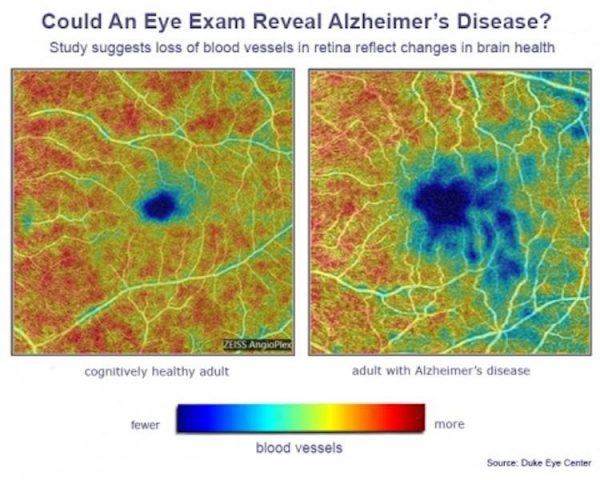Researchers have just made a major stride when it comes to treating Alzheimer’s disease after discovering an eye test that can detect the earliest stages of the illness in seconds.
The technique is called optical coherence tomography angiography, OCTA, and it is a noninvasive scan that looks for changes in blood vessels in the retina. Scientists say that tiny changes in this small piece of tissue mirror those going on in the brain and are the first signs of dementia.
The scan allows doctors to see blood vessels in the back of the eye that are smaller than the width of a human hair, and it can completely revolutionize the way Alzheimer’s is treated because it will detect the disease earlier than ever before.
“If we can detect these blood vessel changes in the retina before any changes in cognition, that would be a game-changer,” said Professor Sharon Fekrat, an ophthalmologist at the Duke Eye Center in Durham, North Carolina. She also served as senior author of the study detailing the scan.
Fekrat and her research team compared the retinas of Alzheimer’s patients, people with mild cognitive impairment (MCI) and healthy controls. They concluded that those with Alzheimer’s had a loss of small retinal blood vessels at the back of the eye with a specific layer of the retina also being thinner. The people with MCI, on the contrary, did not show loss of small retinal blood vessels in the eye.

When researchers took into account other factors such as age and sex, they found that the differences in density were “statistically significant.”
The test could mean that patients will end up receiving treatment years before symptoms of the disease even show. Current sufferers of Alzheimer’s can only get drugs to treat the symptoms, rather than the cause, since there is still no cure.
“Early diagnosis of Alzheimer’s disease is a huge unmet need,” said Fekrat. “It’s not possible for current techniques like a brain scan or lumbar puncture to screen the number of patients with this disease. It’s possible these changes in blood vessel density in the retina may mirror what’s going on in the tiny blood vessels in the brain. Our work is not done.”
Alzheimer’s is one of the cruelest diseases in the world today so we’re excited that such a huge stride like this one has been made! Find out more about this in the video below.
COMMENTS POLICY: We have no tolerance for messages of violence, racism, vulgarity, obscenity or other such discourteous behavior. Thank you for contributing to a respectful and useful online dialogue.